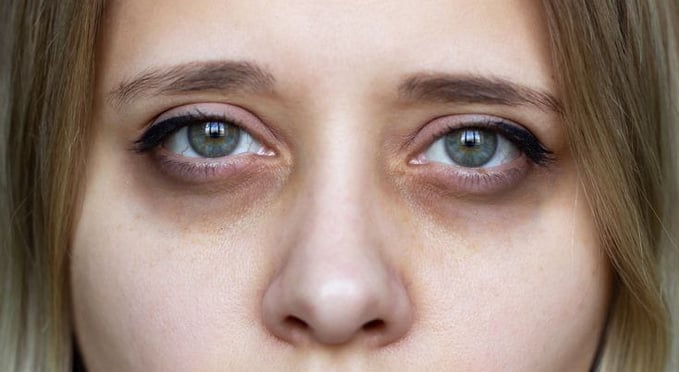Dark Circles: Causes, Remedies, and Effective Solutions
Learn about common causes of dark circles and effective ways to eliminate them. Get tips for a fresher and healthier appearance!
BODY HEALTHDARK CIRCLESUNDER-EYE CIRCLESREMEDIES FOR DARK CIRCLESHEALTHY LIFESTYLE
11/16/20243 min read


Dark circles or panda eye illustration
Dark circles around the eyes are often linked to sleep deprivation. In reality, however, sleep deprivation is not the only element that contributes to this sickness. Dehydration, age, and other medical conditions can also result in dark circles.
Dark circles, which are characterized by under-eye bags that seem darker than the surrounding skin, can affect both men and women. A person who does this frequently appears worn out and older than they actually are.
Causes of Dark Circles
Dark circles have various triggers, including:
Lack of Sleep
Poor blood circulation around the eyes from sleep deprivation makes blood pooling beneath the eyes more noticeable because of the thin skin there. Sleep deprivation can also result in puffy eyes and a lifeless complexion in addition to dark circles.
Aging
The skin loses its suppleness and gets thinner as we age. Dark circles start to show when the blood vessels under the eyes become more apparent.
Screen Exposure
Long-term use of screens on phones, TVs, and laptops can cause eye strain. This causes the blood vessels surrounding the eyes to dilate, giving the area a darker appearance.
Genetic Factors
Inherited dark circles are another possibility. Darker-skinned people are also more likely to develop these circles.
Dehydration
Dark circles can be exacerbated by dehydrated skin beneath the eyes, which appears sunken and lifeless.
Smoking and Alcohol Consumption
Smoking and drinking alcohol are two harmful lifestyle choices that might interfere with blood flow to the skin of the face. These behaviors also deplete collagen, which results in dull, sagging skin.
Sun Exposure
Skin darkening can result from increased melanin production caused by prolonged sun exposure. This may cause the pigmentation around the eyes to become more noticeable.
Allergies
Histamine is released during allergic responses and dry eye conditions, and this can widen blood vessels and make them more noticeable, especially under the eyes.
How to Treat Dark Circles
To reduce or eliminate dark circles, you can try the following steps:
Cold Compress
Put a cold compress with ice wrapped in a fresh cloth over your closed eyes and leave it there for 20 minutes. This lessens the size of the blood vessels beneath the eyes.
Adequate Sleep
Aim for 7 to 9 hours of sleep per night. Sleep deprivation or excess can cause dark circles.
Avoid Smoking, Caffeine, and Alcohol
To avoid dehydration and skin collagen damage, cut back on or quit smoking and limit your intake of alcohol and caffeine.
Use Special Creams
To lighten under-eye circles, use lotions with elements like retinol, hydroquinone, kojic acid, caffeine, or vitamin C.
📝Also read: What Are the Benefits of Kojic Acid?
Use Concealer
Dark circles can be covered with concealers. Apply sparingly and pick a hue that complements your skin tone.
Use Sunscreen
When you're outside, wear sunglasses and apply sunscreen with an SPF of 30 to protect the skin around your eyes.
Avoid Rubbing Your Eyes
Avoid scratching your eyes if they are itchy from allergies to avoid exacerbating dark circles and inflamed blood vessels.
If dark circles persist despite these measures, consult a doctor for more specific treatment options, such as prescription creams or laser therapy
📝Also read : Tips to Improve Sleep Quality for Healthy Skin
FAQs About Dark Circles
Are dark circles able to go out on their own?
If you treat the underlying reasons, including sleep deprivation or dehydration, dark circles may go away on their own. A healthy lifestyle, cold compresses, and specific lotions can all help achieve quicker results.What are some ways to avoid dark circles?
Avoid dark circles by getting enough sleep, wearing sunscreen to protect your skin from the sun, limiting alcohol and caffeine, and being hydrated.Does a lack of sleep usually result in dark circles?
No. Genetics, aging, screen time, dehydration, allergies, and lifestyle choices can all play a role, even though sleep deprivation is a typical culprit.
The causes of dark circles, which can affect everyone, range from genetics to sleep deprivation and dehydration. For solutions to be effective, it is critical to comprehend the underlying problem. There are several ways to lessen under-eye circles, including using cold compresses, getting enough sleep, and using specialty lotions. Prevention is also greatly aided by leading a healthy lifestyle, which includes wearing sunscreen and giving up smoking. See a physician for the proper course of treatment if the condition does not get better.
